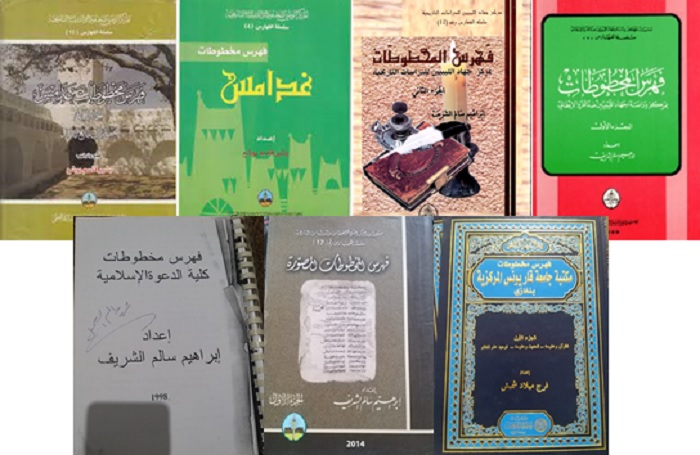The Libya Academy for Advanced Studies organized a lecture on the ZOOM platform entitled: Manuscripts in Libya “Past, Present, and Future,” delivered by Professor Muhammad Salem Al-Ajeel, on the occasion of Arab Manuscript Day.
He talked about the catalogs of manuscripts in Libya, their evaluation, statistics, and some observations about the sciences they contain, which are: Hadith – interpretation – speech – jurisprudence – principles – Sufism – biography – dhikr – biographies – logic – literature of research and debate – language – rhetoric – morphology – prosody – Chemistry – Astronomy – Body – The Secret of the Letter – Arithmetic – Algebra – Medicine – Pharmacy – Veterinary Medicine – History – Geography.
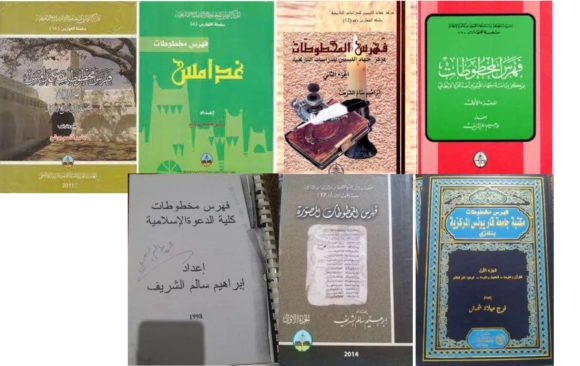
And because human work may be subject to some errors, therefore, some errors have been mentioned in these indexes, in the attribution of writers, the attribution of authors, the presence of unknown books, and the incorrect inclusion of books among the sciences. Examples are in the Qaryounis Index, Part 2, p. 54, where the book Al-I’lam bi Qawat Al-Islam by Ibn Hajar Al-Haythami was included in it. The books of Maliki jurisprudence, and it is correct for them to be with the books of Shafi’i jurisprudence, and in the first part, p. 173, the book Al-Maqamat Al-Suyutiyya was mentioned, and the indexer placed it among the science of hadith, and the correct thing is to place it in the science of literature, and on p. 315 in the third part, the book Al-Imti’ fi Ahkam Al-Sama’ was mentioned, and the indexer placed it among the books of literature. It is correct to include it in the books of jurisprudence….etc.
He also talked about Libyan manuscripts in the world’s libraries, their importance and the necessity of careful investigative work in the catalogs and libraries of neighboring countries and countries of the world.
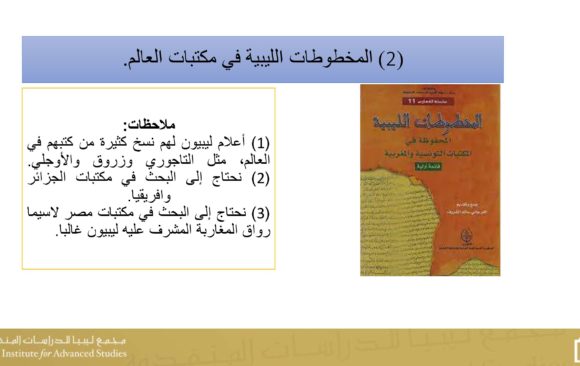
He spoke about public and private manuscript libraries and what has not been cataloged, and about the manuscripts mentioned in the library of Muhammad bin Ali Al-Senussi University – and the Benghazi Endowments Library (in which Abdul Hadi Al-Tazi found a loan paper by Ibn Ashour for Al-Sadafi’s copy of Sahih Al-Bukhari). Where are the manuscripts and where are their primary indexes?!
Regarding the manuscripts of Dar al-Kutub Library in Benghazi, I learned from one of the professors that they originally contained manuscripts that a professor borrowed from Western Europe and did not return!
The Tripoli Endowments Library and its initial catalog should be printed, due to the presence of manuscripts in the catalog and their absence in the Jihad Center catalog later.
And about the libraries of sheikhs, scholars, teachers, and muftis, and what happened in them, and the necessity of taking care of them, such as the library of Professor Ali Al-Misrati, may God protect him – and the libraries of historians and writers.
The importance of indexing and printing and putting effort into it, and the problem of heirs and the distribution of one book among the heirs due to ignorance.
He also called for contemplating the looted, lost and burned libraries, and legitimate questions about the library of the Mizran Mosque – the library of Ahmed Pasha College – the libraries of the mosques – the libraries of the zawiyas – the library of Zawiyat al-Sabaa bin Baraka Zliten, and what was exposed to it by Zawiya al-Jaghbub and other zawiyas, and the necessity of complete statistical research work. Accurate and complete.
He spoke about what happened to the Al-Zawiya Al-Asmariya Library, which was subjected to an attack, attack, burning, and looting, destroying more than 6,000 thousand documents and manuscripts. The Libyan Association for Libraries, Information and Archives issued a statement in 2012 denouncing what happened and denouncing it in a lasting testimony to history, in which governments and their security and research institutions failed to do so.
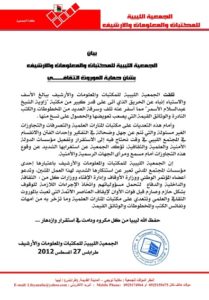 Here you will find some of the contents of the Asmariya Library within the last book fair before the attack that occurred on 8/23/2012.
Here you will find some of the contents of the Asmariya Library within the last book fair before the attack that occurred on 8/23/2012.
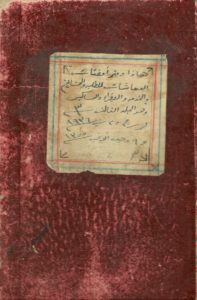
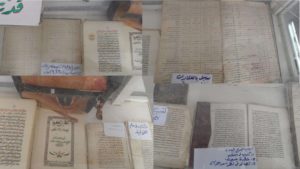
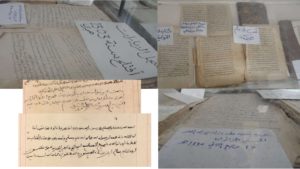
Here is a video about the effects of burning and looting of documents in Asmariya
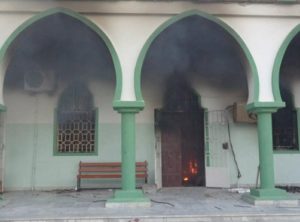
The Al-Zawiya Al-Asmariya Endowment office contains documents and manuscripts
The researcher also pointed out what happened to the highly important Qaryounis Library of Benghazi, and its catalog containing 3 volumes, in addition to the unindexed manuscripts, of attacks on the manuscripts, and then their finding, and the lack of certain knowledge of their condition now.
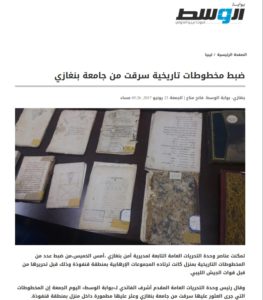
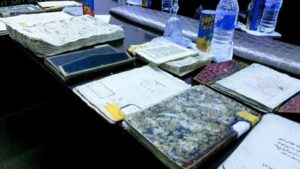


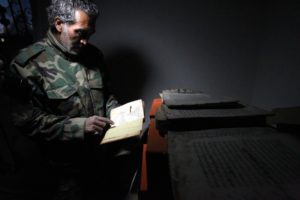
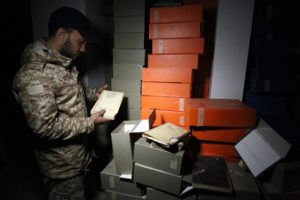
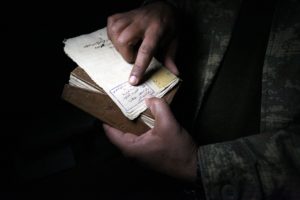
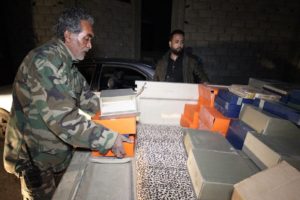
He pointed out the problem of the trade and smuggling of manuscripts, and mentioned some of the news contained in the newspapers in particular.
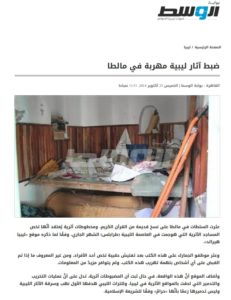
He concluded by mentioning some recommendations, including:
- Electronic documentation and digitization and the importance of this.
- Electronic indexing and electronic publishing and its benefits.
- Photocopying documents and manuscripts and depositing copies of them in international libraries.
- Conducting studies on published indexes and their quality.
- Conduct a survey of manuscript catalogs to search for Libyan manuscripts, and also visit libraries.
- Making a bibliography of edited and published Libyan manuscripts.
- He created a bibliography in which the Libyans took care of the manuscripts, indexing, writing, investigating, and publishing.
- Making a book containing the writings of Libyan scholars and authors.
- Paying attention to documented biographies and biographies for investigators, indexers, and those interested in the Libyan manuscript.
- Educating the children of authors, writers, scholars, and judges about the importance of the book, its indexing, and the dedications and footnotes written on it.
Professor Dr. Ahmed Omran bin Sulayem also participated in a distinguished intervention in which he issued a call to everyone who owns a manuscript or supervises libraries, manuscripts, or rare periodicals to provide them and give them to the institutions concerned with preserving them in the optimal way.
The necessity of holding workshops to preserve and restore the manuscript, and qualifying young people in this regard, and the necessity of universities paying attention to the manuscript, verifying and studying it, and training students, to build the Libyan heritage and communication between grandparents and grandchildren, and including these books in academic curricula.
Dr. participated. Hussein Al-Faqih, and spoke about the importance of digitizing manuscripts, and that it is helpful in saving what remains of our heritage, given the problems that the Libyan manuscript has been exposed to due to the negligence of the concerned authorities.
It is possible to put the manuscript in digital form, and make it available to researchers to access digital repositories quickly. The Europeans were interested in manuscripts and created various websites and large and many digital repositories, available to the reader and researcher, and the necessity of benefiting from international experiences and finding helpful solutions.
Libyan universities do not pay much attention to manuscripts in the field of scientific research, and master’s and doctoral dissertations should focus on editing, studying, preserving, and producing manuscripts in a clear manner.
To follow the full meeting, please click here.


